#arab folktales
Text
POMEGRANATE SEED
@themousefromfantasyland @faintingheroine @princesssarisa @softlytowardthesun @grimoireoffolkloreandfairytales @the-blue-fairie @inevitablemoment @thealmightyemprex @tamisdava2 @natache @gstone97 @lord-antihero @professorlehnsherr-almashy
(Arab folktale from Palestine and Israel. Recorded by Yoel Perez, from the mouth of Zahia Ghurayfât (60) of the 'Arab al-Ghurayfât tribe of Bayt Zarzîr, September 11, 1982)
Oh, honored listened to the words, shall we tell a tale, or shall I sleep? Let's tell a tale.
There was a woman who was not able to become pregnant, and she could not bring forth children. Her husband was a working man.
One day a merchant came and was hawking his goods, saying:
"Pomegranate for pregnancy! Pomegranate for pregnancy!"
The woman came, took a mug full of pomegranate seeds and said:
"Oh Allah, Allah be praised and exalted! With Your might and by Your miracles and Your exalted state and Supreme Being, let me have a daughter or a son like the seeds of this pomegranate, red and good. Praised be Allah sublime, who is mighty with His ability, power and supremacy!"
Twenty years later she gave birth to a daughter whom she called Pomegranate Seed. The daughter was very pretty and and beautiful. Her beauty was incomparable. When anyone saw her, they would say:
"Pomegranate Seed is more beautiful than her mother!"
Then her mother became jealous and angry, whenever she heard that her daughter was more beautiful than she. Then her father started to like the daughter more than the mother. The mother, upon hearing this, would ask him:
"Why do you love the daughter more than me?"
He said to her:
"Because she is more beautiful and better than you."
Subsequently she started to ask the stars:
"Oh Stars, who is more beautiful, I or Pomegranate Seed?"
The Stars replied:
"Pomegranate Seed."
Then she asked the Moon:
"Oh Moon, who is better, I or Pomegranate Seed?"
The Moon replied:
"Pomegranate Seed."
She asked:
"Oh Arabs, who is better, I or Pomegranate Seed?"
They said to her:
"Pomegranate Seed."
In the end she asked all the people, and all of them prefered Pomegranate Seed. Then she said:
"I want to spill the blood of that girl and to slay her."
The mother prepared provisions for a journey and said to her daughter:
"We want to go to your uncles."
The daughter said to the mother:
"No, how can we go? I don't know my uncles."
The mother said to her:
"I want to introduce you to your uncles."
Then she took the daughter through mountains and valleys in which there was nothing except hyenas and ghouls, and other such creatures. They both stayed in an area full of rocks until night fell, the sun set, and the world became dark. There was no moon.
The mother said to her daughter:
"Let's go to sleep."
The daughter said to her mother:
"My hair is joined to yours, my flesh is tied to your flesh, and I shall sew my dress to yours, and your will be beneath my head, and my arm will be beneath your head."
The girl remained asleep until the Sun rose upon her, and she became hot. She woke up to find that nobody was beside her. She started screaming:
"Mother! Mother!"
There was nobody near her.
Then a ghoulah came and said:
"May Allah watch over you, Oh darling Pomegranate Seed! Allah be with you! May the safety of Allah be with you, and whoever forsakes you will be forsaken by Allah! From where did you come to me? From the gate of happiness to the gate of hell?"
The girl said to her:
"I was brought here by good fortune and by luck."
Thereupon the ghoulah took the girl with her.
The ghoulah was roaming freely with gazelles, and she took the girl along with the gazelles to a cave, to a natural cave, like the ones used by goats. She let the gazelles into the cave, and brought the girl in was well. She warmed her and dressed her. She said to her:
"You are my daughter, by the covenant of Allah, and whosoever betrays you will be betrayed by Allah! For I have been looking for you for a long time, Oh Pomegranate Seed!"
The ghoulah roamed with the gazelles, and every day she would take the gazelles with her as she roamed about. When she returned, she would shout:
"Oh Pomegranate Seed! Open the door for the gazelles!"
And Pomegranate Seed would clear the door for the gazelles.
The ghoulah led the girl in the cave, and all of a sudden she saw houses in the interior of the cave. The ghoulah showed her a door and a faucet, and told her that she was allowed to open them, but warned her that whatever room was closed she should beware of opening it. She gave her the keys to the entire place.
Once the ghoulah was absent, the girl went around and started to open the places which she had been warned not to open. She opened the first faucet, and dipped her finger into it. All of a sudden, her finger was all gold, and then the gold stuck to her finger. She tried to remove the gold from the finger, but could not. She opened another place, and all of a sudden there were two girls there, hanging by their hair. She did not speak to them, but closed the door, and while doing so she injured her finger, and wrapped it up.
The ghoulah came back, and said to Pomegranate Seed:
"Open the door for the gazelles! They give milk from their horns, they give milk from their teats. Oh Pomegranate Seed! Open the door for the gazelles, they give milk from their horns, they give milk from their teats!"
She opened the door and, behold, the finger of Pomegranate Seed was wrapped up. The ghoulah asked her:
"Why is your finger wrapped up, Oh my darling?"
She said to her:
"It was injured."
The ghoulah knew the truth, and she said to her:
"Let me see it!"
The girl said to her:
"No, it hurts me."
"Let me see it!"
"No, it hurts me!"
The ghoulah said to her:
"Did I not tell you not to open that door?"
However, the matter was of no importance, since the girl was dear to her.
One day, a merchant was hawking his goods, shouting:
"Buckles, combs for sale!"
It was the first time that a merchant came to this place on a donkey.
Pomegranate Seed looked at his wares, because she had much gold to spend. She asked his permission to take his merchandise. He asked her:
"Are there any human beings in this place?"
She said to him:
"I am a human being, I am Pomegranate Seed."
He said to her:
"Pomegranate Seed used to live in our neighborhood, but her mother took her and shed her blood."
She said to him:
"I am Pomegranate Seed. Is my mother still there?"
He said to her:
"Yes."
She said to him:
"I want to entrust you with a little gold to give to my mother."
He said to her:
"Good."
She gave the merchant a little gold wrapped in an envelope, to deliver to her mother.
Her mother was very upset about her daughter. She wanted to kill her, she no longer wanted to have a child. She wondered, saying:
"I abandoned her among the debris of rocks, and yet she is still alive! I want to kill her!"
She said to the merchant:
"Return to me!"
She bought a poisoned comb for her daughter and when the merchant returned, she gave it to him for her daughter. She told him:
"I entrust you with it for my daughter. Let nobody else open it, except my daughter, and when you arrive there let her wash and clean herself, and make sure that she combs her hair."
The merchant set on his rounds, carrying his gold and his property. He went to Pomegranate Seed, and told her:
"This is what your mother entrusted to me!"
Thereupon she heated up water on the fire, and washed her hair. Then she started to comb it. The first time she combed her hair the teeth of the comb broke on her head. The second time her fingers were broken.
The third time Pomegranate Seed died.
The ghoulah came back from afar, and started to shout:
"Pomegranate Seed! Open the door for the gazelles!"
Nobody answered. The ghoulah said to herself:
"If I find her asleep, she is safe, may Allah be with her, and may the trust of Allah be with her! But if I should find her alive and awake, by Allah, there is nothing else I can do but eat her, eat Pomegranate Seed!"
The ghoulah went to open the door, and there was Pomegranate Seed dead.
"Oh darling! Oh Pomegranate Seed! Oh Pomegranate Seed! Oh Pomegranate Seed!"
Pomegranate Seed did not answer. The ghoulah put rugs and carpets on the floor, dressed Pomegranate Seed in the finest clothes of the most expensive kind. The gold that the ghoulah heaped on Pomegranate Seed could not be heaped on the backs of the camels of love.
She sad:
"Oh camels of love! I beg your trust, don't descend unless you are told the phrase 'By the life of whoever is on your back!' Only then descend!"
The camels of love flew. There were some children playing ball in the field. Among them was a poor man. He was saying:
"Come down, Oh camels of love!"
But the camels did not come down.
The poor man then said:
"By the life of whoever is on your back, come down, camels of love!"
The camels of love came down. When they came down, the poor man said to them:
"Keep all the money and gold, I want to take only the girl! I shall ask my mother to wash her, and we shall bury her."
The youth, took the property and the gold, and the rugs and carpets, and he took Pomegranate Seed and brought her to his mother. He said to her:
"Oh my mother!"
She said to him:
"Oh my son!"
He said to her:
"Heat up some water, Oh my mother, and wash this young woman. I found her dead on the back of the camels of love. Let us wash her and bury her."
She said to him:
"Yes, Oh my son!"
Thereupon she started to light the fire, and she brought a pot that resembled a jar of copper, and brought water and heated it. She carried in the girl and spread mat under her, and started to wash her for burial. Who would be willing to bury her? As she was washing her, the woman shook the girl's head, and behold there was four or five teeth of a comb in her head. She plucked out the first one, whereupon Pomegranate Seed said:
"Ouch!"
She plucked out the second one, and again Pomegranate Seed:
"Ouch!"
Then she plucked out the third one, and she said:
"I witness that there is no God but Allah, and I witness that Muhammad is the messenger of Allah!"
When she said that, the woman said:
"This girl was dead, and now she has come back to life!"
She brought clothes for her, and dressed her, and she woke up, and behold, she was Pomegranate Seed!
The woman stopped showing her to the Arabs (i.e., she hid her), fearing that somebody would her and take her to marry his son, or that the king would take her for his son.
Day after day the old woman would go to the water, and Pomegranate Seed would ask her:
"Let me go with you to the water!"
But she said to her:
"No, Oh my darling!"
One day the king's son saw her and fell in love with her. He told his father and mother:
"I want the sister of the poor boy!"
They said to him:
"He has no sisters."
He said to them:
"I shall never get better if I don't get that girl!"
They went to the old woman and told her.
She said to them:
"This is my son's wife, and her story is such and such and such. She is not my daughter."
They said to her:
"We want her even so, even if by force!"
The old woman took the girl and went to the king's son. He was told her story, from its beggining to the end. The king's son did not stop wanting to go to see the poor girl. They told him:
"Allah sent her as a gift to the poor man; it is a sin for you to take her away. You can take any girl you want."
He said:
"Yes, of course!"
He came and gave the poor man fifty sheep, fifty goats, and fifty cows, and gave him property. He then married Pomegranate Seed, and brought her to the poor man.
27 notes
·
View notes
Text
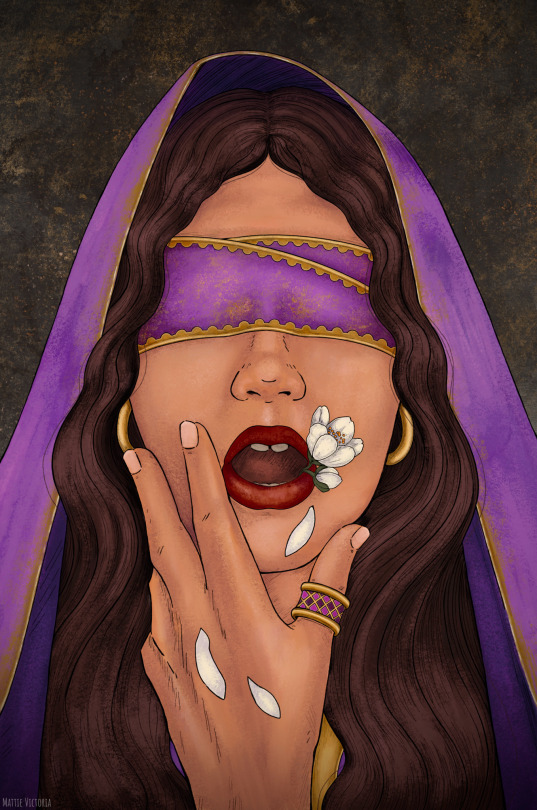
I wasn’t feeling well yesterday so I’m posting this today— my entry for Folktale Week Day 1: Lost. I chose the Iraqi folktale The Girl Who Spoke Jasmines and Lillies, about a young woman born with many enchanting gifts— one of which allows jasmines and lilies to blossom from her lips every time she speaks. Despite losing her eyesight to her jealous aunts and cousins, the protagonist of the tale is still able to ultimately marry the prince to whom she was originally betrothed to with the power of her gifts.
9 notes
·
View notes
Text
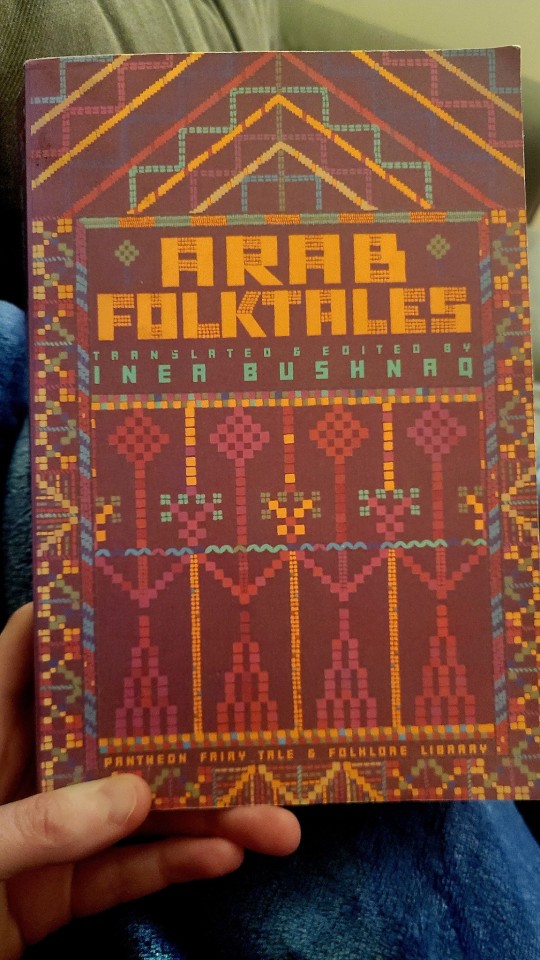
NEW BOOK, SO GOOD, LOSING MY MIND! Already the tales in here are just juicy delicious!
The translator collected most of the oral tales from the West Bank and then compared them to popular written variations by reputable Arab scholars, eventually settling on retellings she felt were representative and would resonate with English-speaking readers. The result is a set of extremely lyrical tales.
As per usual, faithful folktale translations are often filled with racism and other forms of bigotry, so approach with awareness and maturity. Still an excellent source so far, highly recommended!
5 notes
·
View notes
Text
Once upon a time
Everyone knows once upon a time, but did you know that countless cultures have their variation of how classic stories begin, and one one from Welsh is, "A long time ago," similar to a few others from other cultures that go, "A long long time ago."
But, some, like Lithuanian go: "Beyond nine seas, beyond nine lagoons," similar to the Czech, "Beyond seven mountain ranges, beyond seven rivers."
These are some variations from Arab texts: This happened or maybe it did not. The time is long past and much is forgot.
There was or there was not—is anything sure or certain but the greatness of Allah?—a king so powerful that man and Djinn bowed before him.
This is how many Hausa tales are begun “A story, a story. Let it go, let it come.”
And of course, we have one that is a combination and modern invention that has become part of media culture and storied greatness: "A long time ago in a galaxy far, far away." <3
These are just some. But it's been among the most wonderful part of my research before I began putting down the first words for Tales of Tremaine. But the art of storytelling is one of the most human things there is. It's central to us, and it has passed long and far by tongue and time over lands and through cultures. Some beginnings are so similar to each other, some not so much.
But then you see the threads between them in the stories, the themes, tropes, archetypes, motifs. But the traditions span the world. They are old. They are cool. And they are beautiful.
And storytelling is one of the gifts that connects us all, like music, and other arts.
#once upon a time#how stories begin#Lithuanian#Czech#arabic#Hausa tales#welsh folklore#European lore#world folklore#in a galaxy far far away#art of storytelling#storytelling#storytelling techniques#stories#djinn#archetypes#what about your culture#did i miss anything#what did I miss#add your own#add your own thoughts#folklore#myths and legends#folktales
144 notes
·
View notes
Text
almost became the joker my professor during final critique ignored everything i had said to him about the importance of diasporism in my work and in the pieces i showed him specifically and then said i had "some hebrew text" on there oh my god yall
#je parle#i deserve an award for putting up with this#girl HEBREW?#YIDDISH. AND LADINO#my painstaking solitreo got called HEBREW TEXT#my careful mix of arabic and yiddish-language folktales#got reduced to. HEBREW TEXT.#murder
11 notes
·
View notes
Text
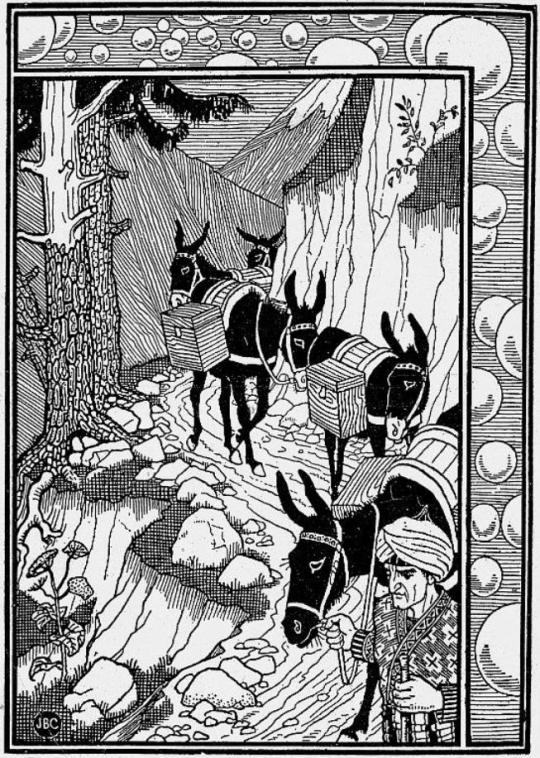
Joseph Benwell Clark (British/English, 1857–1938) • Illustration from Sindbad the Sailor & Ali Baba and the Forty Thieves • London: Lawrence & Bullen • 1896
#illustration#art#illustrator#artwork#joseph benwell clark#british illustrator#pen & ink illustration#ali baba folktale#arabic folktale#old folktales#folktale illustration#sassafras and moonshine illustration blog
4 notes
·
View notes
Text
*The Tale of Tsar Saltan, of His Son the Renowned and Mighty Bogatyr Prince Gvidon Saltanovich, and of the Beautiful Princess-Swan
My tag for this series is 'fairy tales'.
#polls#fairy tales#folktales#the emperor's new clothes#the story of the princess arab zandiq#beauty and the beast#aladdin and the wonderful lamp#aladdin#arabian nights#the magic mill#the king of cats#the tale of tsar saltan#the great race#diamonds and toads#toads and diamonds
22 notes
·
View notes
Text
So we can't play characters in Aladdin, a centuries-old Arab folktale, because in the 90's an American company made an Orientalist animated-adaptation where they used some Indian elements, so therefore its okay to erase us from our folktales and contribute them to a completely separate/unrelated culture.
We can't play characters in Dune, a story from a sc-fi novel that's explicitly inspired by Arabic/Islamic culture and the European colonialism of the Middle East, because it takes place in a planet called Arrakis (literally based on Iraq) so therefore it just a "FIcTioNal pLanet! It hAs NoTHinG tO Do wiTH REaL wOrLD CuLtUreS!!."
We can't play characters from Kahndaq, a country that's literally located in the real-life Sinai Peninsula (which is a part of Egypt), but because it's own independent country that got detached from Egypt, people will gaslight us into thinking it has nothing to do with Egypt or any Arab county, so therefore its okay not to hire any Egyptian or Arab actors.
And now we can't even play characters from a fictional kingdom called "ARABster," probably the most stereotypical Arabic nation in fiction ever with how down-right stereotypically Arabic it is (it's in the name for God's sake), because the studio's CEO is a racist Zionist and because 20+ years later in a random book that wasn't even written by the author there's a line that claims they might have been slightly inspired by an Indian city on top of his extremely heavy inspiration of Egypt.
Like Goddamn, who tf are we supposed to play then? Beside racist caricatures that dehumanize and demonize us so that people who grow up watching them will not feel sorry for us when the US's army kills us, I'm sure Hollywood will make sure to hire us for those roles.
146 notes
·
View notes
Text

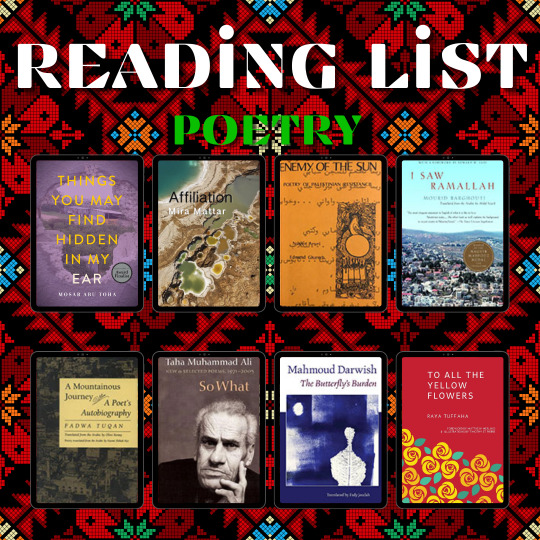
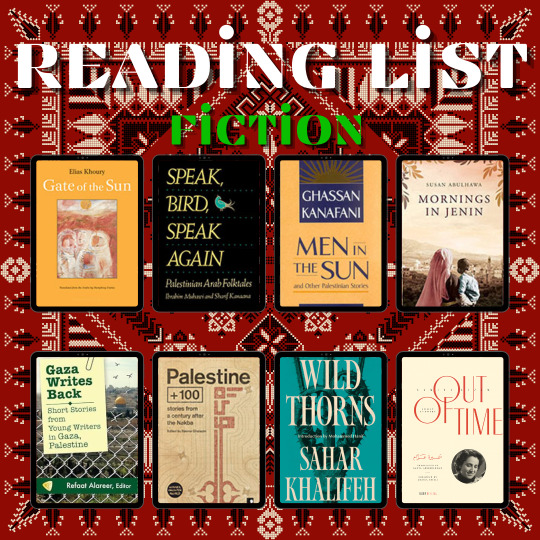
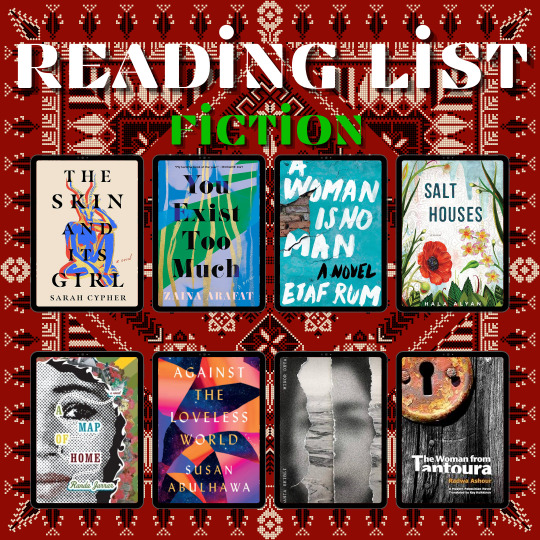
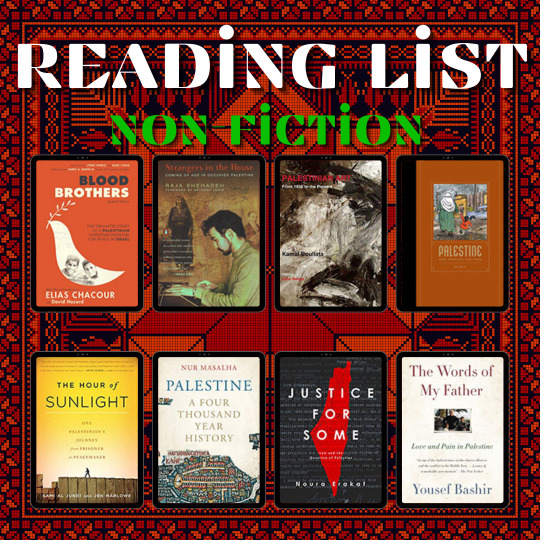

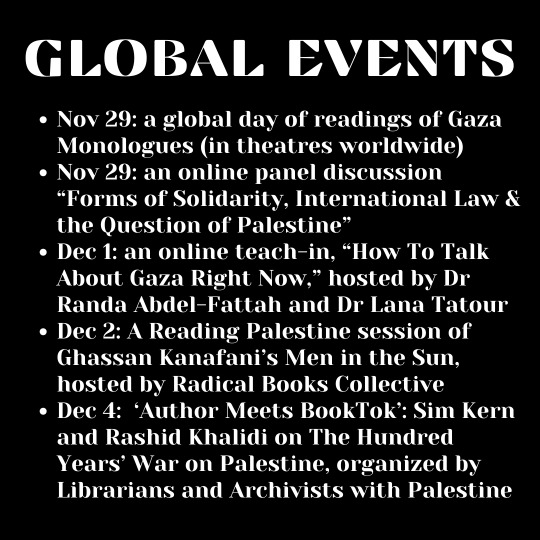
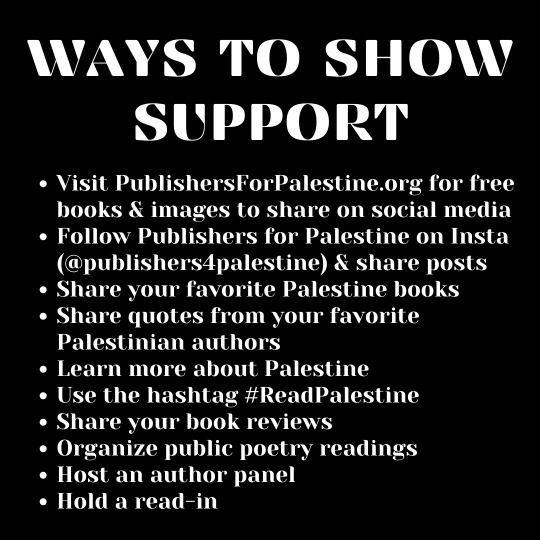
Read Palestine Week
🇵🇸 Good morning, my beautiful bookish bats. Can I start by saying a huge THANK YOU for sharing my Queer Palestinian Book post? Seriously, thank you so much. Let's keep that momentum by observing Read Palestine Week (Nov 29 - Dec 5). I've compiled a list of books to help you, along with a list of upcoming events and resources you can use this week and beyond.
🇵🇸 A collective of over 350 global publishers and individuals issued a public statement expressing solidarity with the Palestinian people. Publishers for Palestine have organized an international #ReadPalestine week, starting today (International Day of Solidarity with the Palestinian People).
🇵🇸 These publishers have made many resources and e-books available for free (with more to come). A few include award-winning fiction and poetry by Palestinian and Palestinian diaspora authors. You'll also find non-fiction books about Palestinian history, politics, arts, culture, and “books about organizing, resistance, and solidarity for a Free Palestine.” You can visit publishersforpalestine.org to download some of the books they have available.
POETRY
🌙 Things You May Find Hidden in My Ear by Mosab Abu Toha
🌙 Affiliation by Mira Mattar
🌙 Enemy of the Sun by Samih al-Qasim
🌙 I Saw Ramallah by Mourid Barghouti
🌙 A Mountainous Journey by Fadwa Tuqan
🌙 So What by Taha Muhammad Ali
🌙 The Butterfly’s Burden by Mahmoud Darwish
🌙 To All the Yellow Flowers by Raya Tuffaha
FICTION
🌙 Gate of the Sun by Elias Khoury
🌙 Speak, Bird, Speak Again: Palestinian Arab Folktales
🌙 Men in the Sun by Ghassan Kanafani
🌙 Morning in Jenin by Susan Abulhawa
🌙 Gaze Writes Back by Young Writers in Gaze
🌙 Palestine +100:Stories from a Century after the Nakba
🌙 Wild Thorns by Sahar Khalifeh
🌙 Out of Time by Samira Azzam
🌙 The Skin and Its Girl by Sarah Cypher
🌙 You Exist Too Much by Zaina Arafat
🌙 A Woman is No Man by Etaf Rum
🌙 Salt Houses by Hala Alyan
🌙 A Map of Home by Randa Jarrar
🌙 Against the Loveless World by Susan Abulhawa
🌙 Minor Detail by Adania Shibli
🌙 The Woman From Tantoura by Radwa Ashour
NON-FICTION
🌙 Blood Brothers by Elias Chacour
🌙 Strangers in the House: Coming of Age in Occupied Palestine by Raja Shehadeh
🌙 Palestinian Art, 1850–2005 by Kamal Boullata
🌙 Palestine by Joe Sacco
🌙 The Hour of Sunlight: One Palestinian’s Journey from Prisoner to Peacemaker by Sami Al Jundi & Jen Marlowe
🌙 Palestine: A Four Thousand Year History by Nur Masalha
🌙 Justice for Some: Law and the Question of Palestine by Noura Erakat
🌙 The Words of My Father: Love and Pain in Palestine by Yousef Khalil Bashir
🌙 Traditional Palestinian Costume: Origins and Evolution by Hanan Karaman Munayyer
🌙 Mountain against the Sea: Essays on Palestinian Society and Culture by Salim Tamari
🌙 This Is Not a Border: Reportage and Reflection from the Palestine Festival of Literature
🌙 We Could Have Been Friends, My Father and I: A Palestinian Memoir, by Raja Shehadeh
🌙 Les échos de la mémoire. Une enfance palestinienne à Jérusalem, by Issa J. Boullata
🌙 A Party For Thaera: Palestinian Women Write Life In Prison
🌙 Light in Gaza: Writings Born of Fire,
🌙 Voices of the Nakba: A Living History of Palestine
#free palestine#save palestine#books#book list#book recs#book recommendation#booklr#book blog#batty about books#battyaboutbooks#arab american heritage month#arab american writers#palestinian writers#palestinian poetry#poetry#poetry books#nonfiction#fiction books#queer fiction#queer community#queer books#muslim writers#read palestine week
231 notes
·
View notes
Note
Hey!!! Could you please share some undead folklore??? I am needing it for a story but it is very hard to go after it without only getting the modern conception of a "zombie"
Anon, anon I am blowing you kisses, I am utterly uninterested in modern zombies but I love me some undead folklore!
First things first: there are lots of words to refer to undead beings and they are often used interchangably. Personally I tend to call anything that was once human but died and then returned and is still a physical, corporeal being, a "revenant". This excludes ghosts and apparitions, which could definitely be called undead, but usually serve a different function in stories.
But, among revenants there is still a lot of variety! In their reason for being undead, in their appearance, their behaviour, and the rules they (seem to) follow. What kind of folklore you want to draw from for your story, will depend entirely on what kind of role they need to fulfill in your narrative. So here is some broad inspiration:
• In an earlier post I wrote about a category of revenant that I call "The Returning Recently Dead", who behave almost like a ghost with unfinished business and I mostly see in the types: the slighted (out for revenge), the grief-bound lover (could be tragic or horrific), the cursed with a duty (out to complete their task), the loving with a duty (out to protect their loved one). They all follow very different rules, but there's some great inspiration there! (Some more examples in this post.)
• There is also a specific folklore tale type called "The Grateful Dead" which usually involves someone being respectful of someone's burial place or otherwise kind towards the dead, who is later helped by a Mysterious Helper who can do fantastic things but doesn't seem entirely...human...
• Folklore also includes revenants that are more of a bad omen or a simply creepy sight to happen upon. The returning recently dead and the grateful dead tend to temporarily visit the land of the living, but some folktales depict The Dead as still very capable of interacting with life if they choose to, if only for their own amusement. This post about Dullahan has some great examples of that (dancing skeletons, undead processions, etc.) and this Icelandic tale is still one of my favourites.
• Of course most vampires are also revenants, but since most people will treat them as a category all their own, I will too. I do want to give a shout-out to what Montague Summers called "ghouls" and attributed to Arabic folklore. Especially the tales of Amine and Nadille, who each marry living human men, who then slowly find out that their pretty, pale wives, who hardly seem to eat anything and are only lively at night, are not what they seem. (You can read Summers' text here.)
One thing that is very important about all these undead, is that they are intelligent. Some of them can pass for human, others genuinely look dead, but most of them are capable of speaking and complex actions. They are not mindless killers or shambling creatures. Those do exist in folklore, but they usually end up more in the "don't walk across the graveyard at night or you'll be eaten alive" type of cautionary folktale that pops up all over Europe. Wich is all well and good, but makes for much shorter stories~
#revenants#undead#this was fun! hope it's helpful anon#if you were in need of something more specific please don't hesitate to send a follow up question and I'll do my best#laura babbles#folklore
72 notes
·
View notes
Text
LOULIYYA, DAUGHTER OF MORGAN
@hamlet-macbeth-othello
@softlytowardthesun @adarkrainbow @natache @grimoireoffolkloreandfairytales @professorlehnsherr-almashy @themousefromfantasyland @the-blue-fairie @tamisdava2 @faintingheroine @princesssarisa @angelixgutz @amalthea9 @allthegoodbobdylanlyricsaretaken @thealmightyemprex
(A folktale from Egypt)
ONCE THERE WAS a king and his wife who did not have any children. One day the queen prayed to God, “Oh God, my God, who hears my prayers, be kind to me and grant me a child. I will name him Yousif.” She made a nadr:
“If I have a child, I will make three wells and fill them, one with honey, one with butter, and one with rosewater.”
Time passed. One day went and one day came, and she became pregnant. She had a boy whom she called Yousif.
The king and his wife almost flew with joy. One year after another, Yousif grew up, and he was going to school.
With time, while the king was asleep he heard a hatif saying, “King, fulfill your pledge. Fulfill the pledge that you owe.”
This happened three times. Every time the king forgot. Yousif became ill.
They got him all the kingdom’s doctors and the sheiks. No one could cure him. Finally they said, “Maybe there is an unfulfilled pledge. Think! Have you made a pledge, king?”
The king and the queen remembered their promise. Immediately the king ordered that three large wells be dug and lined with china tile and filled to the top - one with honey, the second with butter, and the third with rosewater.
And he dispatched a crier to announce in town, “Oh God’s people, people of this town, he who wants honey, butter, and rosewater should come tomorrow to the king’s palace.”
That was it. With the appearance of the morning star, everyone in town was rushing to the king’s palace. This one carrying a saucepan, that one carrying a wash tub, and this one and that one! They clustered around on the three wells, and almost immediately they were empty. After a short while there was nothing at all. A while later, an old woman came leaning on a cane. She had three cans on a tray which she carried on top of her head. When she found that the wells were empty, she took out a little piece of sponge and began sponging the drops off the walls of the wells. After a very long time, she had hardly filled her three small cans, and she turned back to go home. Now the king’s son, Yousif, was playing with his ball. He threw his ball like this-and it hit the old woman. She fell on the ground, and everything was spilled.
Yousif ran to her and said, “Never mind, old mother. I am wrong.”
The woman answered, “With what can I curse you? With what can I curse you, son? You are too young. I am going to curse you with Louliyya, daughter of Morgan,” and she left.
He went to his father and mother and asked them, “Who is Louliyya, daughter of Morgan?”
They answered him, “Son, you are too young. You should have nothing to do with these things.”
Everytime he asked someone, the answer was, “You have nothing to do with these things.”
Finally an old servant said to him, “She is a beautiful girl that you have to find yourself.”
That was it. He went to his mother and father and said, “Prepare rations for me. I’m going out into the world. I have to find Louliyya, daughter of Morgan.”
When they heard this, their hearts sank to their toes. They kept on crying and imploring him, “Don’t do this, son. Stay away from her. No one has gone to find her and come back. We have no one else but you.”
He answered them, “It is no use.”
He finally took a horse, food and water, and some money and left.
He kept on moving from God’s countries to God’s peoples. One town carried him, and another town put him down, until the inhabited part of the world ended. He kept on traveling in the desert.
After a while, he saw dust coming from a distance. It came closer and closer. He looked to find a ghoul coming toward him. The moment the ghoul was by his side, he greeted him, “Peace be upon you, father ghoul.”
The ghoul answered, “Had your greeting not preceded your speech, I would have devoured your flesh before gnawing on your bones. What do you want?”
He answered, “I’m looking for Louliyya, daughter of Morgan.”
The ogre said, “Son, keep on going. You will meet my brother. He is one day older than I am and a year more knowledgeable.”
Yousif kept on going until he saw another cloud of dust, larger than the one before it. It came closer and closer, and finally when the ghoul was next to him, he said, “Peace be upon you, father ghoul.”
The ghoul replied, “Had your greeting not preceded your speech, I would have devoured your flesh before gnawing on your bones. What do you want?”
He replied, “I want to know how to reach Louliyya, daughter of Morgan.”
The ogre said to him, “Keep on going. Ahead you will meet my brother. He is one day older than myself and a year more knowledgeable.”
He kept on going until he met the third brother. He was much larger and much more fearsome than the first two. Yousif said to him, “Peace be upon you, father ghoul.”
The ghoul replied, “Had your greeting not preceded your speech, I would have devoured your flesh before gnawing on your bones. What do you want?”
He replied, “I want to know how to reach Louliyya, daughter of Morgan.”
The ghoul said, “Ahead of you you’ll find my sister, and she is the only one who can tell you how to reach her. When you get there, if you find her with her red chicks around her and her hair combed and groomed, don’t you dare say a word or make her feel your presence; but if you find her with her hair messed up and her green chicks around her and her breasts thrown over her shoulder you can talk to her, for she is going to be in a good mood.”
Yousif left and kept on going and going.
When he reached the ghoula’s house, he hid and peeped. He saw that her hair was well groomed and her red chicks were hopping up and down around her. He did not say a word and remained in his place.
After a while, about sunset, she messed up her hair and started catching her red chicks and eating them.
She let out her green chicks from the pen and threw her breasts behind her back and started singing. Yousif tiptoed behind her. The chicks saw him and shouted, “Somebody’s coming!” but she was singing so loudly that she did not hear them.
Of course she was in a good mood. When Yousif reached her, he suckled each of her breasts once. She shouted, “Ahhh, now you are my ‘milkson.’ You suckled my right breast, you became like my son Isma‘Aeen; you suckled my left breast, you became like my son ‘Aabdel-‘Aal! What do you want?”
He said, “Louliyya, daughter of Morgan.”
She said to him, “Why, son? You are too young to die.”
Even if his head was against a thousand swords, he insisted and said, “Never! I have to find Louliyya, daughter of Morgan.”
She said, “Well, take this ball and this racket. Hit the ball with the racket, and wherever the ball goes, you follow it. They will take you to the place you want to go.”
That was it. Yousif got back on his horse and struck the ball with the racket.
The ball flew into the air, landed on the ground, and kept on rolling. Mounted on his horse, Yousif followed it.
He kept on hitting the ball and running after it, hitting the ball and running after it, hitting the ball and running after it.
Hit and run, hit and run, hit and run, until finally he found himself in front of a huge palace in the middle of the desert.
This palace was high, high, high; it had neither windows nor gates. He went around it, and finally he saw one small window at the top of the palace.
As he stood wondering about this palace and thinking who it might be who owned it, he saw a huge dust cloud coming from far, far away.
He heard a dog barking and a big commotion. He hid himself behind a big boulder and peeped out. He saw an ghoul much larger than all the ghouls he had met.
The ghoul came to the palace and shouted, “Oh Louliyya, daughter of Morgan, let down your long hair and take your father the ghoul away from the heat of the hills.”
Yousif saw the little window open, and out of it appeared a young woman whose beauty was indescribable. Glory be to the creator for his creation!
She swung her hair out of the window, and it came down until it reached the ground. Her father the ghoul climbed up on her hair.
Pull, pull, pull, he was up there. He got in, and the window was closed. When he got inside, he asked her, “What have you cooked for us today?”
She said, “Such-and-such,’’ and served him what she had cooked.
He ate, and after that he rested his head and went to sleep. Now to whom do we return?
To Yousif outside! He kept himself hidden until the morning of the following day.
The window opened, and the hair was let down from it, and the ghoul climbed down on Louliyya’s hair. Yousif waited until the dust disappeared. He came out of his hiding place and shouted, “Oh Louliyya, daughter of Morgan, let your long hair down and take Yousif, for whom you have been predestined, away from the heat of the hills.”
The window was opened, and he looked up and saw her looking down. When she saw him, her heart softened for him; she fell in love with him. She said to him, “What brought you here? Get away with your skin still on your body! For if my father sees you, he will kill you and drink from your blood”’
He said to her, “Before I go, lift me up, and I will tell you my story.”
She swung her hair out, and he climbed up. He told her his story from hello to good-bye and said to her, “You are predestined for me, and we must get back to the house of my father and mother. We must escape from here.”
She said to him, “Escape to where? The distance we could cover in a day my father the ghoul will cover in one step.”
As they were talking, they heard a big commotion and heard her father shouting, “Oh Louliyya, daughter of Morgan, let your long hair down and take your father away from the heat of the hills.”
She was frightened and said, “What a catastrophe! My father the ghoul is back. Where shall I hide you/! Where shall I hide you/!”
She transformed him into a pin and pinned it on her chest.
When her father came up, he asked her, “What took you so long?”
She said, “Nothing; I was just in the bath.”
The ghoul started sniffing around, saying, “I smell the trace of a human not of our race.”
She said to him, “There is nothing.”
He looked all over the place and did not find anything. He asked for his food, and after he had eaten, he went to sleep. The following day the ghoul left as usual.
As soon as he was gone, she pulled the pin out of her collar; it became Yousif.
She said to him, “We must go now!”
She got some henna and tinted everything in the house with rose coloring. She overlooked only one thing, the tambourine. It hid from her underneath the sofa. She took her comb, her sewing needle, and her mirror, and she went out with Yousif.
When her father the ghoul returned, he started calling “Oh Louliyya!”
Nobody answered.
“Oh Louliyya!”
Nobody answered. Finally, when he became impatient, he started calling on everything in the house. “Oh chair!”
The chair said, “She is sitting on me!”
“Oh bed!”
The bed answered, “She is sleeping in me!”
“Oh bathtub!”
The bathtub answered, “She is bathing in me!”
Finally the tambourine started dancing and singing.
“Tumm ti dum, tshshsht, tshshsht, Tumm ti dum, tuu, tuu, Yousif took her and flew! Tuu, tuu, Yousif took her and flew.”
That was it. The ghoul heard this, and he went mad. He got his dogs to sniff around, and they flew after them.
Now we return to whom? To Yousif and Louliyya. They kept on going until they finally saw the cloud of dust coming from afar.
It kept on getting bigger and bigger until it blocked the sun; it was just like nighttime. Louliyya took out her needle and threw it back over her shoulder. Immediately it became a field of thorns.
The ghoul and his dog went right through it; the thorns pierced their feet. The ghoul kept saying to his dog, “Pluck out, my dog, and I’ll pluck out with you. Pluck out, my dog, and I’ll pluck out with you.”
Meanwhile Yousif and Louliyya were far away.
After a little while the ghoul drew very near to them again. Louliyya threw her comb back over her shoulder. Immediately the comb became a thick hedge of bamboo.
They got lost in it. The ghoul kept saying to his dog , “Chop down, my dog, and I’ll chop down with you. Chop down, my dog, and I’ll chop down with you.”
Yousif and Louliyya got a little bit farther away from them. Again the ghoul drew very close to them. Louliyya threw her mirror back over her shoulder. Immediately it became a lake.
When the ghoul got to it, he and his dog started drinking it. The ghoul would say, “Drink, my dog, and I will drink with you. Drink, my dog, and I will drink with you.”
They kept on drinking and drinking and drinking until they exploded. Before the ogre died, he threw some pins at them. As soon as the pins struck them, Louliyya became a she-dog, and Yousif became a lark.
He flew away. Louliyya kept on going until she reached Yousif‘s parents. She lay down in front of the doorstep and kept on barking.
No one paid any attention to her.
Yousif kept on coming back and hovering over the house and singing, “How are you, how are you, Louliyya, in the house of my father and mother?”
Louliyya would answer back, “Over me is dust, underneath me is dust, just like a dog’s place of rest, Yousif!”
One day Yousif's mother heard her saying, “Yousif.”
She and Yousif‘s father had become blind from crying over their son. She asked the dog, “What did you say?”
It repeated what it had said. Yousif‘s mother took her inside and made a bed of straw for her in the stable.
The following day Yousif hovered over the house singing, “How are you, how are you, Louliyya, in the house of my father and mother?”
She answered back, “Over me is straw, and underneath me is straw, just like a mare’s place of rest, Yousif.”
Yousif‘s mother heard this, and she said to herself, “Something must be the matter with this dog.”
She took her upstairs and put her in a room with a bed with silk sheets and covers. The following day, when Yousif hovered over the house singing, “How are you, how are you, Louliyya, in the house of my father and mother?” she replied, “Over me is silk, and silk is underneath me, just like a prince’s place of rest, Yousif.”
Yousif‘s mother was listening this time. She heard the whole thing. She entered the room and called the dog to her. It went to her. She kept on feeling its body and caressing it with her hand.
As she was passing her hand over its head, she found three pins pierced deep in it. She pulled them out, and immediately, with the omnipotence of the Omnipotent, she became a beautiful young lady again.
She told Yousif‘s mother and father about all that happened, how her father imprisoned her, how Yousif came to her-everything that happened. She said to them, “Get me some sugar, and I will get Yousif back.”
“How?” they asked her.
She answered, “Just wait and see.”
The following morning Yousif came back hovering over the house and said, “How are you, Louliyya, in the house of my father and mother?”
She said, “I have some sugar for you,” and she put her hand with granulated sugar in it out the window.
The lark perched on the palm of her hand to have some sugar. Ooops! She caught it! She found three pins stuck in its head. As soon as she plucked them out, the lark-with God’s omnipotence-became Yousif again.
He went and embraced his father and mother; their sight was restored by God’s will.
Yousif and Louliyya got married! The celebration lasted for forty days and forty nights.
They lived in stability and prosperity and begat boys and girls.
Now toota, toota, the tale is over. Was it sweet or dragging? If sweet, you owe a song, if dragging, you owe a story.
#arabic#egypt#fairy tales#folktales#folklore#fantasy#literature#maiden in the tower#magic flight#rapunzel
10 notes
·
View notes
Text

The Kitāb al-Bulhān (Arabic: كتاب البلهان), or Book of Wonders, is a 14th and 15th century Arabic manuscript,[1] compiled by Hassan Esfahani (Abd al-Hasan Al-Isfahani) probably bound during the reign of Jalayirid Sultan Ahmad (1382–1410) in Baghdad. The contents include subjects on astronomy, astrology and geomancy, including a section of full-page illustrations, with plates dedicated to the discourse topic, e.g. a folktale, a sign of the zodiac, a prophet, etc.
173 notes
·
View notes
Text



My OC for tokyo ghoul art fight : Gûlyabani
Just explaining what his name means is enough to describe what he is about I think. The gûlyabani is a folktale (mostly arabic) and it is basically the equivelent of "ghoul" as gûl is pronounced almost the same. The turkish translation of tokyo ghoul translates the word "ghoul" as "gûl" as well (which is still the reason why I refuse to read it. It looks dumb to me). And obviously this monster is said to eat humans! :D It fits pretty well I think!
The depiction of him I decided to go with is the one that appeared in old turkish movies. Maybe some people can guess which one...
My character is human tho, and he cannibalizes on other humans. I thought a human character that disguised their cannibalizm as a ghoul's fault to get away with their crimes was an interesting idea. The CCG would not think a human would do such a thing, as ghoulphobic as they are, no matter how many clues suggest otherwise. The codename they give him is Gulyabani, lets just pretend an immigrant at HQ new about the tale or something.
I think a character like this would emphasize the idea that not only ghouls can lose themselves to violent consumption and that humans are just as capable of acts like this too. I imagine the identity of this murderer would be a hard pill to swallow for the CCG.
What his personal reasons are for cannibalizm tho I am not super clear on, I think he does it as a way to stick it to humany for the pains they caused him, to feel above other humans, reveling in the irony of it all as well.
I read somewhere that the folktale gulyabani offers tricks to desert travelers, like a sphinx, and eats them if they give a wrong answer. This could be wrong tho cause I dont remember well but I think we can adopt this idea for how this old man gets the best of his victims. By catching them off guard with a riddle maybe?
@tokyoghoulartfight2024
#my art#art#tg art fight 2024#tokyo ghoul#my oc stuff#also the way it is spelled doesnt matter much dw about it. gulyabani is fine 👍
22 notes
·
View notes
Text



Arab character of the day is Zarqa from the Saudi-Japanese anime "Future Folktales" and she is based on the Zarqa al Yamama folktale.
15 notes
·
View notes
Photo
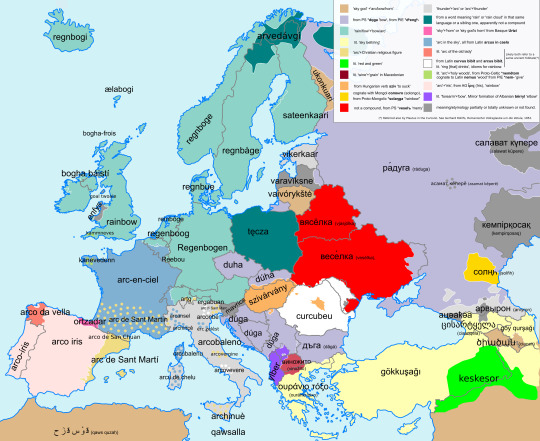
Meaning of the stems of the words for "rainbow" in the languages of Europe.
by u/nickanc
'Rainbow' is typically a compound word in most European languages. Generally, speaking, a part of the word comes from words meaning bow, belt, ring, circle or arc in their respective languages or ancestor languages. The other one varies and is the main concern of this work.
Some incomplete notes on the meanings and the etymologies I gathered while making the map:
'sky god' + 'arc/bow':
Arabic from Quzah, a pre-islamic deity of weather
Maltese from Maltese alla 'god', from Allah, the islamic deity,
Karelian from Ukko, Finnic sky god
Lithuanian from Vaiva, goddess of Baltic mythology
Armenian is uncertain, supposed to derive ultimately from PIE *dyew- 'shine'
from PS *dǫga "bow". they all are not compounds, except maybe for Russian
'rain/flow'+'bow/arc':
Germanic ones but faroese from PG *regnaburô 'rainbow' obvious compound, *burô comes from PIE *bhewgh-
Faroese æla means shower (as in weather), formerly "flow quickly", from PG *ēlaz "eel"
Finnish from Proto-Finnic *satadak "fall, rain"
Irish and Scot Gaelic are compound words in their very language, there are many other interesting Irish words.
'arc of the old lady' and 'circus bibit', 'arcus bibit'. In some ancient folklore tales, that appear in various IE families, various weather phenomena are especially linked with magical or religious figures that assume the form of old ladies. In Italian and Romanian folklore there are the 'giorni della vecchia'/'zilele babelor' that are the days 29th-31st of March, when the cold is expected to return. In Romania an old lady is Baba Dochia that brings forth the spring and various other Babele populate the Romanian folklore; in the Gallo-italic folklore of Italy there is a folklore fog spirit named Borda that is an old lady personifying the fog, Gaelic mythology has its weather old lady Cailleach, the Indian summer is called in German Altweibersommer lit. 'old women's summer'. The rainbow is no exception: Plautus in the Curculio hints at a folktale of an old lady that drinks "like" the rainbow does or maybe is the rainbow itself, hence also other etymologies for rainbow related to expressions like "circus bibit", "arcus bibit", "arcus imbibens" etc.that give etymologies in various languages. Venetian arcombé and Ladin ergabuan come from arcus imbibiens (source), whereas Romanian curcubeu likely from curvus bibit and Neapolitan arcovevere from arcus bibit. Note that expressions containing the rainbow and the old lady or the act of drinking exist in many languages in this map and their dialects, just they are not the common word for rainbow. For example, in Moldovan there is brîul babei that means 'rainbow' (source), Slovenia has the dialectal word pijâvka 'rainbow' from PS *piti 'to drink', while in Spain and Portugal dialectal expressions that are cognates of the Galician one are apparently common, in Czech there is an idiom pije jak duha that means 'drink like a rainbow', i.e. being a drunkard. Ultimately all what I found points to a 1952 article of Gerhard Rohlfs, Romanischer Volksglaube um die Vetula, which however I was not able to find. EDIT: The Hungarian word is linked to the image of drinking the rainbow too, see below.
'thunder'+'arc' or 'arc'+'thunder':
Estonian is apparently cognate with Livonian pit'kiz kor(?) 'rainbow', lit. 'thunder bow', according to this source, though this comment offers more insight on the origin of the word.
Italian arcobaleno where baleno means flash, thunder, apparently from balena, 'whale', due to a popular habit to make many phenomena zoomorphic or anthropomorphic (the map I posted for fog in northern Italy presents a similar case with she-wolves). Alternatively, there is an article supposedly connecting the words of the 4. with arcobaleno: they suggest that, at some stages of the languages and the sociocultural development, the old lady was an old lady of the sea, thus a whale and their witness would be Galician vella 'old lady' which - according to that article - is a word that could mean also whale. The article is aimed ultimately to strengthen the Paleolithic Continuity Theory, so probably there is little to no scientific consensus on it, though at least I hope their examples are not as disputed as their conclusions.
color: teal. from word meaning "rain":
Polish from(?) OCS тѫча 'rain' and cognate with Russian ту́ча 'rain cloud'
Northern Sami related with Northern Sami arvedálki 'rainy weather'
Basque: 'horn of the sky' or 'sky god's horn', from Basque Urtzi
'arc'+figure of Christian religious figure (Saint John, Saint Martin, Saint Mark, Noah, the Virgin). The choice of the figure seems related to the days of these saints (St. Martin is during the Indian summer, related to 4.), though I have not that much experience on the topic to ascertain that. Noah is clearly linked with rain.
color: green. literally 'arc'+'holy woods', from Proto-Celtic *nemētom, cognate to Latin nemus 'wood' from PIE *nem- 'give, take' source, apparently suggesting a sacred role for the rainbow in Celtic traditions.
Curiosity, not sure if or how it is related to 9. and the other words conveying a sacred meaning for rainbow: in southern Italy, the rainbow was superstitiously considered the cause of jaundice, as màlë du uàrchë is jaundice (source]
273 notes
·
View notes
Note
It might be cool to see dullahan for pride month. I don't think any original stories about dullahan are particularly queer but her depiction SMTIV is something I think about a lot. Taking a red pill and changing gender is definitely a more accurate interpretation of the matrix than other times people talk about the red pill at least lol
Dullahan - Day 49 (Request)
Race: Haunt
Alignment: Neutral-Neutral
June 6th, 2024

Yeah, shoutout to the random NPC in SMT IV who eats a red and instantly transes their gender. A true icon. Today's Demon of the Day is a very common fixture of medieval fantasy, however, and not just a bit of someone's true identity- the headless knight of no renown, Dullahan. Headless Horsemen are a common sight in many tales spanning Europe, the subjects of many a legend or fairy tale, but each of these halloween fables can trace their roots all the way back to Celtic myth, in the form of this unseelie fairie... or so some think. In truth, the origins of the Dullahan are unclear and murky, much like the foggy skies it mingles within, so let's dig in!
Ireland is no stranger to weird fairy tales- as the place where the term fairy originated from, Celtic myth is filled with tales upon tales of weird, loveable goons that paint stranger and stranger pictures of the times each time one thinks about them. Whether it be the oh-so-elusive Cat-Síth or the inanely wailing Banshee, Celtic folktales are filled to the brim with creatures at the forefront of each and every story... which is what makes the Dullahan so bizarre. While the concept of a headless horse-riding knight isn't too out there, especially in comparison to some other fairies (looking at you, Pooka), very few primary sources actually attest to the existence of the Dullahan, whether it be by name or concept alike.
However, in spite of this, we do have a few historical accounts- this makes the Dullahan's existence frustratingly vague, to say the least, as it's impossible to say if it did or did not exist- either possibility is plausible, especially given that artwork depicting the Dullahan does exist, dating back to the 1800's. As according to Doris V. Sutherland, the earliest reference to the Dullahan can be found in 1802, within a text written by Charles Vallancey called "Prospectus of a Dictionary of the Language of the Aire Coti, or Ancient Irish, Compared with the Language of the Cuti, or Ancient Persians, with the Hindoostanee, the Arabic, and Chaldean Languages." Kind of a mouthful. Within the book, which is a compendium of all sorts of languages and drawn comparisons between them (among all sorts of other stuff, I'm too lazy to find a free copy of it online though lol), there is a segment in which Vallancey draws a comparison between the Irish Dullahan and an Arabian demon, the Wulahan.
"The Dullahan or Wullahan is a terrible bug-bear at this day; the peasants hear him in the night dragging a heavy chain through the villages and along the roads; this is the wulahan, or Satanas of the Arabs…"
As pointed out by Sutherland, though, the brief description given of only a few passages has no mention of it being headless. So why is it commonly seen as being headless? Skip ahead a few years and we get to a book by Thomas Cofton Croker going into the fairies of Irish folklore, and stories pertaining to them. Among the many fairies listed in this book, entitled "Fairy Legends and Traditions of the South of Ireland," we get to our second mention of the Dullahan! In one of five segments, a tale is given regarding a man named Larry Dodd who gets a random hitchhiker one day atop horseback- a mysterious woman whose every feature was covered by a cloak. She climbs aboard after he offers so, and they take off.
After a few moments of silent, uncomfortable riding, the woman exits suddenly to head to a nearby church. Smitten, Larry chases after the woman to try and pursue a thank-you kiss, but when he catches up with her... shock! Horror! She has no head! So that's where the idea of the Dullahan came from as being headless- and likely why the Dullahan in SMT is so feminine in appearance as well. After witnessing a dance of the Dullahans in the dead of night, he's decapitated... only to come to a few hours later, confused from the whole sordid affair.
This tale is only one of four, however- the general idea of Dullahans and the Headless Horsemen being synonymous actually came from this same book as well. A later story is, well, quite literally the fable of the Headless Horseman! From these tales, we can glean quite a few things- almost every account of the Dullahan comes from this book, with the name being spurned from the Prospectus and its offhand mentioning of the 'Irish Dullahan' as though it were common knowledge. I'm of two minds here, personally- for one, it's entirely possible that Croker, pardon my french, just made some shit up, basing his fables on pure speculation as to what the Dullahan name could mean by connecting it to the Arabian Wulahan. However, the other possibility, one that I personally subscribe to, is that the Dullahan was a part of the tapestry of Celtic folklore- it was just obscure.
The tales presented clearly speak of the Dullahan as though it were a preexisting concept, and the offhand mention of its existence in the Prospectus seems to give light to the idea that it did, indeed, exist in the cultural consciousness to some extent. Of course, this is all purely guesswork on my end- unless Croker digs himself out of his grave to answer my burning questions, I doubt I'll find an exact answer to this line of thinking- but I think it makes the most sense given what little information we have to work off of.
Now, in terms of representation in SMT... It sure is a headless knight. One aspect I really adore in this design, though, has to be the way the top of the head appears- the implication of the Dullahan being able to freely attach and detach its head like the joints on a Bionicle is hilarious, and gives a whole new line of depth to this already cool looking design. The silver, deep purple, and gold all combine to make the knight look regal, as though it was a stalwart protector of a kingdom under the king's right hand that had now fallen into disrepair. Somewhat fitting, given that it appears most prominently in SMT IV as a boss!
Lastly, though, I've gotta say I'm so glad we're almost to 50 posts. I didn't expect this series to last this long, and we've got a big, big one coming up for post 50, so I hope you're all excited! Happy Pride Month, and I need to say thanks for sticking with me, all this time.
#smt#shin megami tensei#megaten#persona#daily#ask#dullahan#the fact that my primary source for this one was another trans person is not lost on me lmao#esp given that the npc eating the red is very#VERY. trans coded#all that aside#holy shit#we're almost at 50 posts!!!#the next one is gonna be a biiiig one#i hope y'all will look forward to a big ol' bug
11 notes
·
View notes